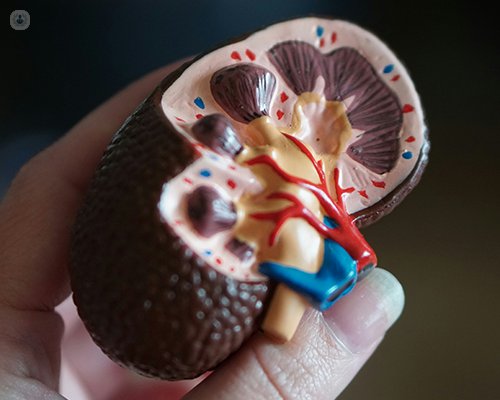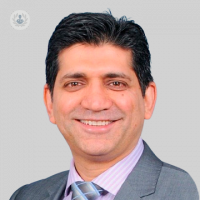Robotic partial nephrectomy for kidney tumour treatment
Written in association with:Robotic partial nephrectomy is a novel minimally invasive surgical procedure that allows urological surgeons to remove kidney tumours while preserving the healthy portion of the kidney. With advancements in robotic-assisted surgery, patients now benefit from enhanced precision, faster recovery times, and fewer complications compared to traditional open surgery.
Mr Azhar Khan, renowned Consultant Urological and Robotic Surgeon, provides an expert insight into the procedure.

Why might I need robotic partial nephrectomy?
Robotic partial nephrectomy is primarily indicated to treat small kidney tumours and localised renal cancer. Patients with the following kidney tumours may be recommended robotic partial nephrectomy: renal cell carcinoma, benign kidney tumours such as oncocytoma or angiomyolipoma, and hereditary kidney conditions like von Hippel-Lindau disease.
The goal of a robotic partial nephrectomy is to remove the cancerous or abnormal growth of the kidney while sparing the remaining healthy kidney tissue, which is essential for preventing long-term complications such as chronic kidney disease.
How is robotic partial nephrectomy performed?
Robotic partial nephrectomy is performed using a robotic surgical system which includes a set of robotic arms controlled by a specialist, such as a urological surgeon, who is seated at a console. The robotic arms hold and manoeuvre small instruments that are inserted into the patient’s abdomen through small incisions.
On the day of the procedure, your urological surgeon will make several small incisions (about 1-2 cm each) in the abdomen to insert specialised surgical instruments and a 3D camera, which will provide a highly detailed view of the surgical area.
The kidney tumour will then be carefully removed, ensuring that the margins of the tumour are also removed to reduce the risk of leaving cancerous cells behind. At this stage, blood supply to the kidney will be clamped temporarily to minimise bleeding.
After the kidney tumour has been excised, your urological surgeon will reconstruct the kidney to close any openings and restore the organ’s structural integrity. Special attention will be paid to preserving as much healthy tissue as possible to ensure that the kidney continues to function efficiently.
Lastly, the robotic instruments will be withdrawn and the small incisions will be closed. Your urological surgeon will review the surgical results and ensure the successful removal of the tumour. The entire procedure will last between 3 to 5 hours, depending on the complexity and the size of the tumour.
How long is the recovery period after robotic partial nephrectomy?
Recovery from robotic partial nephrectomy is generally faster compared to traditional open surgery. In most cases, you will be discharged within 1 to 3 days post-surgery.
Most patients will return to work and resume normal daily activities within 2 to 3 weeks. However, strenuous activities like heavy lifting or physical exercise should be avoided for 4 to 6 weeks. In some cases, residual tiredness or discomfort may persist, but this will improve over time.
What type of follow-up care is needed after robotic partial nephrectomy?
After surgery, regular follow-up care is essential to monitor your recovery and ensure that no cancer remains or returns.
Your urological surgeon will schedule imaging tests, such as CT scans or MRIs, to assess kidney function and ensure there is no tumour recurrence. Regular blood tests will also be done to check kidney function and to look for any signs of cancer recurrence. Urine tests may be used in some cases to monitor kidney health.
Additionally, to maintain kidney health after the partial nephrectomy, your urological surgeon may recommend specific lifestyle changes, such as staying hydrated, eating a balanced diet low in salt, or avoiding smoking and excessive alcohol consumption.
If cancer was the cause of the tumour, you will need further treatments such as targeted therapy, immunotherapy, or regular monitoring through a surveillance program to ensure early detection of any recurrence.
If you would like to book an appointment with Mr Khan, head on over to his Top Doctors profile today.


